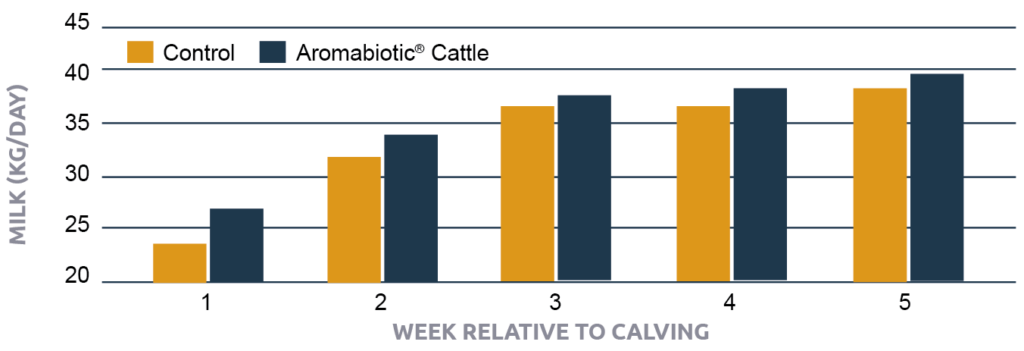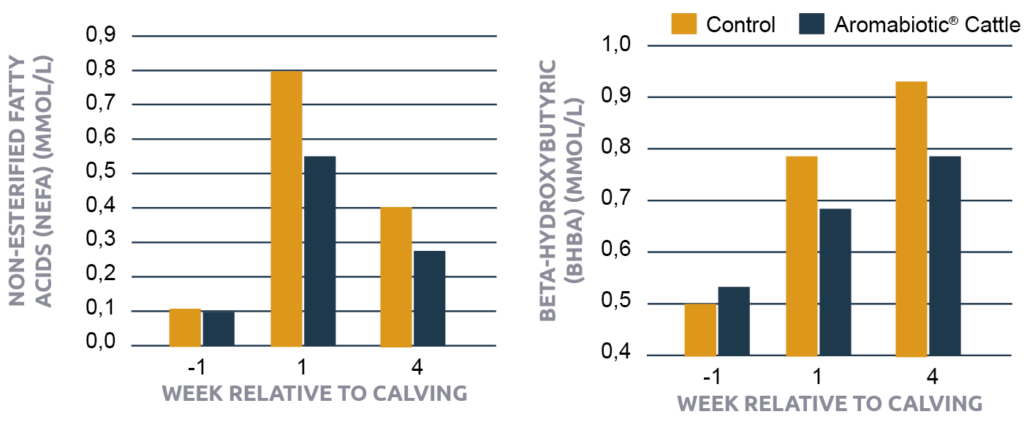Dairy cows are real athletes, producing high amounts of milk. These animals undergo immense physiological stress and are susceptible to metabolic disorders, especially in the period around calving. Agrimprove developed Aromabiotic® Cattle to support ruminant health and performance.
All livestock farmers want a healthy and high-performing herd. Healthy animals require less medication (reducing direct cost and labor) and have higher efficiency (more profit). These high-performing animals are sensitive to physiological stress and therefore susceptible to infections during the transition period. Hence, it is important to provide extra support during challenging times in the production cycle.
Transition challenges
The transition period is one of the most challenging periods in a cow’s life (Figure 1). The metabolism of transition cows changes tremendously due to dietary changes, hormonal fluctuations, preparation for calving, and beginning milk production. Because of this, the innate immune system is under great pressure around calving, making cows more susceptible to infections. Often, it results in decreased feed intake, increasing the risk for a severe negative energy balance and milk fever after calving. Focus on the ration in the dry period is important to guarantee a smooth transition from a pregnant to a lactating animal, as both periods have their own unique nutritional needs. It is of utmost importance to minimize the energy needed for adequate immune responses around calving in order to limit infections. This way, the energy saved can be used for a smooth start-up of lactation instead.

Medium chain fatty acids (MCFA) can support cow health by guaranteeing a smoother transition period. Aromabiotic® Cattle is a carefully balanced mixture of MCFA in an activated free fatty acid form. This makes them readily available to the animal in order to steer rumen fermentation and spare energy that would otherwise be spent supporting the immune system.
Lesser bacterial turnover
Fermentation is positively influenced by a more stable rumen environment and may lead to an increase in milk yield and fewer health problems for dairy cows. Ruminal pH is of great importance not only for a stable environment but also for feed utilization and microbial populations. In the study by Burdick and Oba (2021), at Alberta University, rumen parameters were measured by comparing dairy cows supplemented with Aromabiotic® Cattle to animals without access to this MCFA source. The range of rumen pH (per day) was reduced in the treatment group compared to the control group (1.17 vs. 1.40). This decrease in fluctuation of the rumen pH indicates a stabilized rumen, which could positively influence fermentation and performance.
At the independent research facility of Schothorst Feed Research (SFR) in the Netherlands, 30 cows were followed during the transition period, measuring performance and metabolic parameters. From 4 weeks before until 5 weeks after calving, half of the animals received a control diet and the other half Aromabiotic® Cattle.
Fermentation changes around transition were monitored in this study by assessing lipopolysaccharide (LPS)-binding protein in the blood. LPS is released when bacteria die off, so elevated levels of LPS indicate a high bacteria turnover, which means many changes are happening in the microbial composition in the rumen. Large production of LPS is expected around calving because of the nutritional shift from a fiber-rich dry cow diet to an energy-rich lactating cow diet. High levels of LPS triggers activation of an immune response. Fewer changes in fermentation in the rumen is positive for a smooth transition from the dry to the lactating period. LPS-binding protein in the blood, a marker of LPS production throughout the digestive tract, was markedly lower when Aromabiotic® Cattle was fed. This result is a sign of better rumen health and less production of LPS by bacterial turnover (Figure 2). Decreased LPS-binding protein levels in the blood have also been shown to reduce the vulnerability of cows to develop mastitis (Zeng et al. 2009).

Eventually, lesser bacterial turnover and hence lower LPS production resulted in increased milk production early in lactation (Figure 3).

Sparing energy to alleviate negative energy balance
Nearly all dairy cows experience immune suppression around calving. Specifically, neutrophils play an important role in the first-line immune response of the body. In the transition period, these cells have a shorter lifespan due to the early activation of apoptosis (programmed cell death).
In this controlled environment at SFR, the average cow was healthy and faced low infection pressure, as indicated by low somatic cell count (SCC) numbers (on average 40,000 cells/ml). As the animals did not need large amounts of immune cells to tackle infections, the number of neutrophils was steadily decreasing after calving for both the control group and the Aromabiotic® Cattle group (Figure 4). The study found, the number of living cells decreased faster after calving with Aromabiotic® Cattle, as seen in week 1. This indicates that Aromabiotic® Cattle influences the lifespan of neutrophils. When the infection pressure is low, cells die off faster with Aromabiotic® Cattle, leading to less maintenance of immune cells shortly after calving. By feeding Aromabiotic® Cattle, energy is spared, because less maintenance of the immune response is needed after calving under optimal circumstances.

In contrast, when infection pressure increases (indicated by elevated SCC levels), MCFA from Aromabiotic® Cattle can increase the lifespan of neutrophils. This is indicated by lower apoptosis of neutrophils (Piepers and De Vliegher 2013). In such cases, energy is spared, because fewer cells are needed for the same immune response.
Less metabolic problems
When a dairy cow faces a negative energy balance in early lactation, non-esterified fatty acids (NEFA) are mobilized by the cow’s body to cover the increasing energy demand to obtain high milk production. Excessive mobilization can lead to metabolic diseases such as fatty liver and ketosis. NEFA and beta-hydroxybutyric acid (BHBA) are typical markers of metabolic issues in early lactation. Upon feeding Aromabiotic® Cattle after calving, the presence of NEFA and BHBA was decreased (Figure 5). This indicates fewer health problems can be expected. In both groups, some health problems occurred, which is typical for the transition period, but the number of cases with clinical mastitis was lower for the Aromabiotic® Cattle group. Also, the number of cows having multiple health issues and requiring antibiotic treatment was lower for Aromabiotic® Cattle. Reducing metabolic problems and medical treatments is essential to improve insemination success and to increase the longevity of cows, which ultimately impacts the profitability of the farmer.

Conclusion
By feeding Aromabiotic® Cattle throughout the dry period and during early lactation, a stable rumen environment is created. This helps reduce bacterial turnover during the transition period to support increased milk production after calving. Also, the energy which is needed for an effective immune response is spared, reducing the severeness of the negative energy balance, resulting in fewer metabolic problems and less animals with health problems.
What we want to achieve with Agrimprove? Healthy and well cared for cows that live longer. By striving to extend the cow’s longevity, we create impact on the sustainability of dairy production.